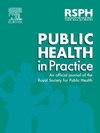Validation of the Global Scale for Early Development (GSED) for children 0 to 36 months of age in the Pacific: protocol
IF 1.9
Q2 PUBLIC, ENVIRONMENTAL & OCCUPATIONAL HEALTH
引用次数: 0
Abstract
Objectives
Early childhood starting at conception is a period of rapid development and has implications for health and well-being throughout the life-course. Validated measures are critical for countries interested in population level monitoring of child development and to evaluate policies and services aimed at enhancing children's health and development. This project aims to address this need for children aged 0–36 months in Kiribati, a small and widely dispersed island nation in the central Pacific Ocean, by adapting and validating the Global Scale for Early Development Short Form (GSED SF). This study contributes uniquely to the literature as it is the first time that the GSED has been adapted and applied in the Oceania-Pacific region.
Study design
Psychometric validation study of the GSED SF in Kiribati.
Methods
The Global Scale for Early Development Short Form (GSED SF) adaptation and validation study will involve 500 children, 100 each from five randomly selected villages in South Tarawa, Kiribati. Validity testing will involve established steps: face validity, cultural and context neutrality, test-retest reliability, inter-rater reliability, construct validity and discriminant validity. We will evaluate measurement invariance including differential item functioning and differential test functioning to ensure that the GSED SF is fair and unbiased.
Conclusions
This project will provide Kiribati with a tool for monitoring and evaluation of early child development in children from birth to 36 months at the national and programmatic level. The study will also provide the first validation of the GSED SF in the Pacific region.
太平洋地区0至36个月儿童早期发展全球量表(GSED)的验证:协议
目的从受孕开始的幼儿期是一个快速发育的时期,对整个生命过程的健康和福祉都有影响。行之有效的措施对于关注人口层面儿童发展监测和评价旨在加强儿童健康和发展的政策和服务的国家至关重要。该项目旨在通过调整和验证全球早期发展简表(GSED SF),解决基里巴斯0-36个月儿童的这一需求。基里巴斯是太平洋中部一个小而分散的岛国。这项研究对文献的贡献是独一无二的,因为它是GSED首次在大洋洲-太平洋地区得到适应和应用。研究设计基里巴斯GSED SF的心理测量验证研究。方法全球早期发展量表(GSED SF)适应和验证研究将涉及500名儿童,每100名儿童来自基里巴斯南塔拉瓦的5个随机选择的村庄。效度测试将包括既定的步骤:面孔效度、文化和情境中立性、重测信度、量表间信度、构念效度和区别效度。我们将评估测量不变性,包括差异项目功能和差异测试功能,以确保GSED SF是公平和无偏的。该项目将为基里巴斯提供一种工具,用于在国家和项目层面监测和评估出生至36个月儿童的早期发展情况。该研究还将首次在太平洋地区验证GSED SF。
本文章由计算机程序翻译,如有差异,请以英文原文为准。
求助全文
约1分钟内获得全文
求助全文

 求助内容:
求助内容: 应助结果提醒方式:
应助结果提醒方式:


